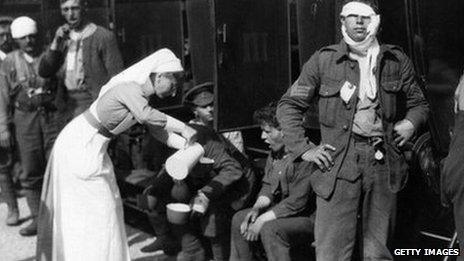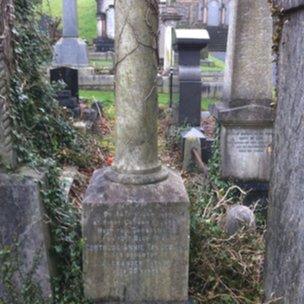Saluting the courage of World War One's VADs
- Published

About 2,000 women from Ireland became voluntary aid detachments (VADs) during World War One
The onset of war in 1914 saw thousands of ordinary women volunteer as nurses in military hospitals at home and abroad, in France, Italy and Russia.
Known as VADs (voluntary aid detachment) they nursed injured soldiers in the midst of the horrors of the Western Front, often with little or no training or equipment.
Now their story is being told in a new big-budget Sunday evening television drama on BBC One called The Crimson Field.
To sign up to the VAD, women had to be aged over 23 and unmarried.
They came from every social class - some straight from the Edwardian drawing room, having barely washed a dish in their lives; others were clerks or kitchen maids.
From this relatively peaceful world they were catapulted onto the battlefields of World War One.
One thing they all had in common was a desire to help the millions of casualties streaming in from the front.
Active service
One such woman was Gertrude Annie Taylor, who signed up to be a VAD and ultimately lost her life as a result.
She is buried in the City Cemetery in Belfast with the inscription - unusual for a woman: "Died in active service".
Belfast councillor Tom Hartley, who has written books on the graves of the City Cemetery, said Ms Taylor was one of about 2,000 women from Ireland who became VADs during World War One.
"She died of pneumonia, which may have even been a precursor of Spanish flu, which killed millions in 1918," Mr Hartley said.
"The inscription on her stone reads that she died in the First Central London hospital on 12 December 1916."

Gertrude Taylor's grave in Belfast City Cemetery
That was just one month after the end of the Battle of the Somme.
Contracting a serious illness on the field was unfortunately a common theme amongst the VADs, according to the writer and creator of The Crimson Field, Sarah Phelps.
"Infection was absolutely rife, you read a lot about nurses getting infections because there were no rubber gloves, so you're dealing with wounds with bare hands, sometimes having to pour bleach on your hands to sterilise them - bleach over cracked bleeding hands, absolute agony," she said.
"They became exhausted and would have collapsed from exhaustion.
"They also suffered from what we now know to be post traumatic stress disorder. And there are lots of stories of nurses just collapsing from exhaustion, from having gone on and on without stopping, because they were there to do a job and they didn't want to stop doing it."
You can hear more about Gertrude Annie Taylor and the VADs from Ireland on Good Morning Ulster on BBC Radio Ulster from 06:30 - 09:00 BST on Friday.
The Crimson Field begins at 21:00 BST on Sunday, BBC One.